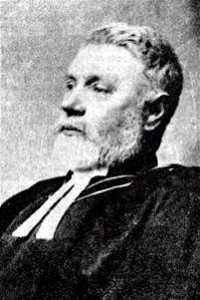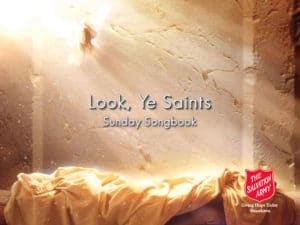O Love that wilt not let me go,
I rest my weary soul in Thee;
I give Thee back the life I owe,
That in Thine ocean depths its flow
May richer, fuller be.
O Light that followest all my way,
I yield my flickering torch to Thee;
My heart restores its borrowed ray,
That in Thy sunshine’s blaze its day
May brighter, fairer be.
O Joy that seekest me through pain,
I cannot close my heart to Thee;
I trace the rainbow through the rain,
And feel the promise is not vain:
That morn shall tearless be.
O cross that liftest up my head,
I dare not ask to fly from thee;
I lay in dust, life’s glory dead,
And from the ground there blossoms red
Life that shall endless be!
 Here is another song by the British preacher, George Matheson, who was featured on this site with his hymn,Make Me a Captive, Lord . Once again, his poetry here uses contrasts and opposites to emphasize his – and our – need for the Lord in all circumstances of life.
Here is another song by the British preacher, George Matheson, who was featured on this site with his hymn,Make Me a Captive, Lord . Once again, his poetry here uses contrasts and opposites to emphasize his – and our – need for the Lord in all circumstances of life.
George’s fiancée returned his ring when she learned that he was going blind, and he continued to experience the pain of her rejection. When his sister, years later, told him of her own engagement, his mind returned to his personal heartache. It is said that he wrote this beautiful song out of his own sadness. How God uses the negatives of our lives!
How God uses the negatives of our lives! Share on XAnother “sad experience turned to good” for George occurred when he was the pastor in the Scottish village of Innellan. One winter night, there were many empty chairs in his church, and he felt quite discouraged, although his ministry had been thriving. Nevertheless, he had put a lot of effort into his sermon, and did his best to deliver it. Unknown to George, there was a visitor in the congregation from the large St. Bernard’s Church in Edinburgh, which was looking for a new pastor. This resulted in George Matheson’s being called, in 1886, to that church, where he became one of Scotland’s favourite preachers.
Another “sad experience turned to good” Share on XWORDS: GEORGE MATHESON MUSIC: ALBERT PEACE
S.A. SONG BOOK 1987 EDITION: #621 SECTION: MEANS OF GRACE – PRAYER
REFERENCE: ROBERT MORGAN, THEN SINGS MY SOUL






